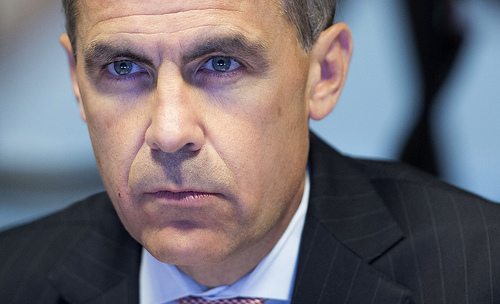

Environment
#COP21: FSB To Establish Task Force On Climate-related Financial Disclosures
The Financial Stability Board (FSB) announced today it is establishing an industry-led disclosure task force on climate-related financial risks under the chairmanship of Michael R. Bloomberg. The Task Force on Climate-related Financial Disclosures (TCFD) will develop voluntary, consistent climate-related financial risk disclosures for use by companies in providing information to lenders, insurers, investors and other stakeholders.
Speaking at the COP21 Paris Climate Change Conference Mark Carney, FSB Chair, said “The FSB is asking the Task Force on Climate-related Financial Disclosures to make recommendations for consistent company disclosures that will help financial market participants understand their climate-related risks. Access to high quality financial information will allow market participants and policymakers to understand and better manage those risks, which are likely to grow with time. Michael’s experience working on climate change issues, his unparalleled track record of execution in a broad range of fields and his lifelong commitment to open and transparent financial markets make him the ideal leader for the Task Force.”
The Task Force will consider the physical, liability and transition risks associated with climate change and what constitutes effective financial disclosures in this area. It will seek to develop a set of recommendations for consistent, comparable, reliable, clear and efficient climate-related disclosures, as set out in the FSB’s proposal in November. The wide range of existing disclosure schemes relating to climate or sustainability highlights the need for companies and relevant stakeholders to reach a consensus on the characteristics of effective disclosures and examples of good practices. In doing so, the industry-led Task Force will take account of the work of other groups related to effective disclosures.
Speaking about his role, Michael R. Bloomberg said “It’s critical that industries and investors understand the risks posed by climate change, but currently there is too little transparency about those risks. When Governor Carney laid out the idea for a Task Force on Climate-related Financial Disclosures, I offered him my full support to help make it a success. While the business and finance communities are already playing a leading role on climate change, through investments in technological innovation and clean energy, this Task Force will accelerate that activity by increasing transparency. And in doing so, it will help make markets more efficient, and economies more stable and resilient.”
The Task Force will conduct its work in two stages. During the first stage, the Task Force will consist of about 10 individuals, who will determine the scope and high-level objectives for its work. It is expected that this first stage will be completed by end-March 2016. During the second stage, the Task Force’s work is likely to be expanded to include up to 30 individuals, focused on delivering specific recommendations for voluntary disclosure principles and leading practices, if appropriate, with a view to completing its work by end-2016. As part of its work the Task Force will conduct public outreach.
In similar fashion to the Enhanced Disclosure Task Force (EDTF), an industry-led group that was established by the FSB in 2012 to make recommendations on financial risk disclosures for banks, the Task Force will comprise senior technical experts from firms that are the preparers and users of company risk disclosures, as well as risk analysts. The members of the Task Force will be private-sector individuals drawn from financial and non-financial companies across a broad range of countries within the FSB’s membership.
Fiona Reynolds, managing director of the PRI (Principles for Responsible Investment) said: “Investors are increasingly aware of the material risks associated with climate change, which has been underscored by a number of policymakers, including Bank of England Governor Mark Carney, who has warned of the risks associated with stranded assets. In the past, investors were content to let governments act; now, we are seeing a real shift, with investors being much more proactive and taking the lead in urging governments, policymakers and other stakeholders to take action on climate change.”
Ben Caldecott, Programme Director, University of Oxford’s Smith School said: “Climate-related disclosures are an important prerequisite for capital to cascade from higher risk, unsustainable investments towards those investments compatible with sustainability. The new Task Force has a vitally important role to play. Michael Bloomberg, who has built a successful business on ensuring the timely, accurate, and consistent provision of comparable information to markets, is surely one of the best possible people Mark Carney could have asked to chair this important process.”
Stephanie Pfeifer, Chief Executive of IIGCC – a European network of Institutional Investors with €13 trillion in assets, said: “Access to high quality information can only help accelerate the reallocation of capital by investors in ways that will accelerate the low carbon transition. More consistent and reliable carbon disclosure will make it easier for investors to evaluate climate risk in their portfolios and understand where the opportunities in clean energy and other essential low carbon technology lie.”
Mark Campanale, founder and executive director, Carbon Tracker said: “Carbon Tracker welcomes further steps to progress the Task Force on Climate-related Financial Disclosures. A key challenge the Task Force faces will be to identity and agree reliable, independent information on ‘carbon bubble’ and ‘stranded assets’ risks, to help market participants manage their transition to a low carbon economy. We remain ready to support this process.”
Alice Garton, Company and Financial Lawyer for ClientEarth, said: “This is a hugely welcome initiative. It’s essential that businesses report their climate-risks clearly and consistently. One of the strongest messages coming out of COP21 is that business as usual is no longer an option. Whether or not we get an international agreement, the INDCs already on the table change the landscape of business and investment decisions dramatically. This increased focus by the FSB, and our own litigation programme designed to create a step-change in climate risk reporting, will drive investors’ capital away from businesses who are unable to demonstrate they are adapting to climate change to those that are. Those businesses that fail to adapt to the new normal will find it impossible to survive.”
Julian Poulter, CEO of Asset Owner Disclosure Project, said: “The Paris climate talks are haggling over $100billion of climate finance, but the real story is the trillions of dollars that are already switching away from fossil fuels towards low carbon assets. Better disclosure of climate and carbon exposure can speed up this transition.”
Dr Raj Thamotheram, CEO, Preventable Surprises, said: “The Task Force on Climate-related Financial Disclosures (TCFD) is a very welcome step – corporate disclosure of 2C transition plans are critical if we are to stay within this 2C ceiling. And there also needs to be an equally hefty initiative to get investors to factor these disclosures into their valuation and stewardship decision–making processes.”
Simon Howard, Chief Executive of the UK Sustainable and Investment Finance Association (UKSIF), said: “This is excellent news. The financial risks in climate change are becoming obvious. Better disclosure and consistent data will not only help investors prepare for the significant challenges ahead but will play a part in identifying the profitable mitigation opportunities which will emerge.”
Chris Cheetham, Global Chief Investment Officer, HSBC Global Asset Management, added: “The establishment of this Task Force is an important step towards creating the transparency and consistent standards needed for investors and pension funds to understand the risks and opportunities within their portfolios as we transition to a low carbon economy.”
Seb Beloe, Head of Sustainability Research, WHEB Asset Management, commented: “This initiative is timely and comes with the high-level leadership needed to reinforce the need for, and rebut attempts to roll-back, climate-related financial disclosures.”
Richard Stathers, Head of Responsible Investment, Schroder Investment Management, added: “Few, if any, corporates have honestly assessed the implication of different climate change scenarios to the economy and their value chain. Yet the research suggests that unconstrained climate change poses a very real risk to long-term asset value and economic productivity and, as a result, to the ability of pension funds to meet future obligations.
The FSBs establishment of the Task Force on Climate-related Financial Disclosures is a very welcome and timely announcement. The outputs of which will not only build on the achievements of other disclosure groups but, more importantly, enable financial markets to better understand how companies are financially exposed, whether positively or negatively, to political efforts to decarbonise the global economy as well as to the physical impacts of climate change already at work.”


 Features11 months ago
Features11 months agoEco-Friendly Cryptocurrencies: Sustainable Investment Choices

 Energy11 months ago
Energy11 months agoThe Growing Role of Solar Panels in Ireland’s Energy Future

 Energy10 months ago
Energy10 months agoGrowth of Solar Power in Dublin: A Sustainable Revolution

 Energy10 months ago
Energy10 months agoRenewable Energy Adoption Can Combat Climate Change




























